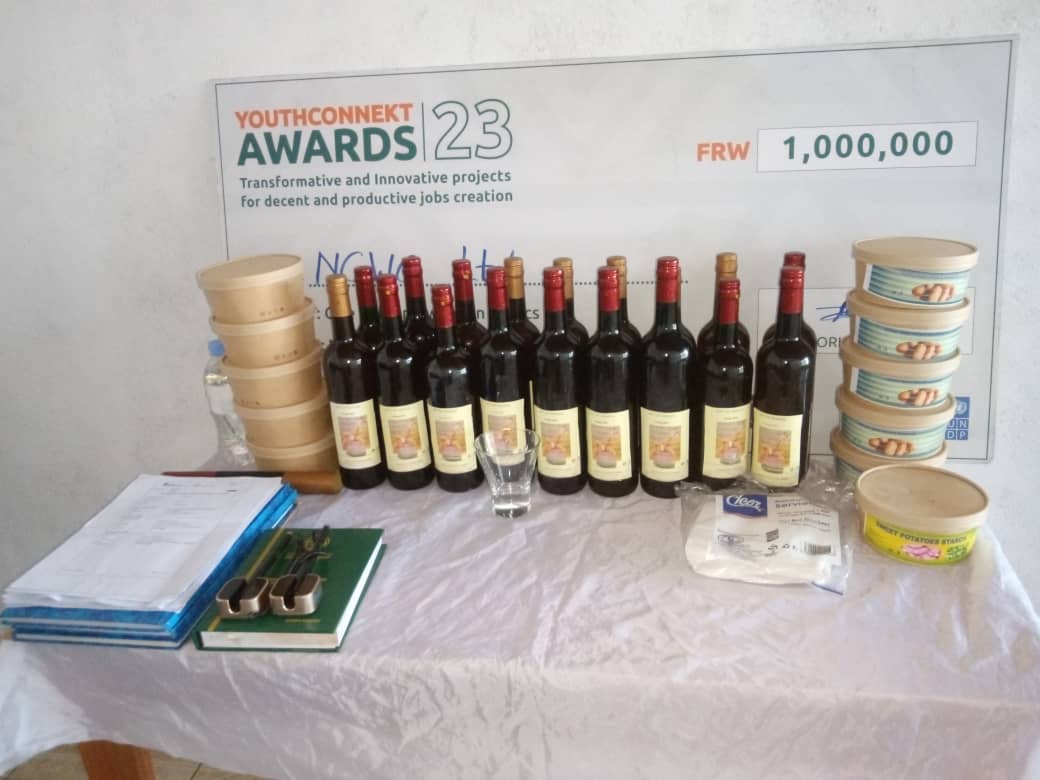Most students in Africa and particularly in Rwanda do not apply the knowledge they acquired in school to create innovative products that could generate income for them.
Unlike others, Christian Ndayambaje from Nyamasheke District in the Western Province innovated a sugar-free wine, thanks to the knowledge he obtained from IPRC Musanze, where he studied how to enhance the value of agricultural produce.
In 2022, this young man observed that potatoes and sweet potatoes in Rwanda were undervalued crops, and sometimes farmers struggled to find a market for them due to the lack of industries to add value to these products.
In his research, he discovered that Rwanda spends money on importing starch used in yogurt production, whereas starch, costing 16,000 RWF per kilogram, can be extracted from locally grown potatoes and sweet potatoes.
This discovery led Ndayambaje to start processing potatoes to extract starch, later adding sweet potatoes to the process. After obtaining starch, he began thinking of what else he could produce from it. He noted that non-communicable diseases were on the rise in Rwanda, partly due to the consumption of non-natural sugars.
He embarked on a journey to convert starch into natural sugar through a process called ‘scientific hydrolysis.’ This sugar is used to make juice for producing wine.
After converting the starch to natural sugar, he found that there was leftover flour, which he didn’t want to waste. In an effort to add value, he started producing biscuits from this flour.
Currently, he has the capacity to produce 90 bottles of wine and 25 kilograms of starch every month.
Starting with equipment worth 230,000 RWF, he now employs five permanent workers and has equipment valued at 2.8 million RWF.
He says, “I also have some savings because I plan to go back to school to finish my degree since I had completed a diploma and saved money that can cover my tuition for two years.”
Ndayambaje started producing both products (biscuits and wine) made from potatoes and sweet potatoes in 2022.
He also had them tested in the INES Ruhengeri laboratory and found they were not harmful to health.
In an interview with Kura, he mentioned that he began the process of seeking a quality assurance certificate from the Rwanda Standards Board (RSB), but he has not yet received it.
He said, “The challenge I’m facing is obtaining the quality assurance certificate because it’s very expensive, and the existing program to promote quality assurance doesn’t seem to apply to my product, and Rwandans are accustomed to quality when you put a product on the market, they immediately ask for the quality assurance certificate.”
Ndayambaje explained that obtaining the certificate is expensive because it requires approval from two institutions: the Rwanda Food and Drug Authority (RFDA) and the Rwanda Standards Board (RSB).
This process also involves a registration fee of 200,000 RWF paid to the Rwanda FDA for inspection.
He suggests, “For young entrepreneurs, either eliminate this fee or allow it to be paid later. Regarding facilities, there should be leniency towards small entrepreneurs, allowing them to improve gradually while they operate.”
Ndayambaje collaborates with farmers from the Rubavu and Nyabihu districts who supply him with potatoes. He uses over 600 kilograms of potatoes a month and aims to establish a factory that will process 1,000 kilograms of starch and produce over 3,000 bottles of wine monthly.



